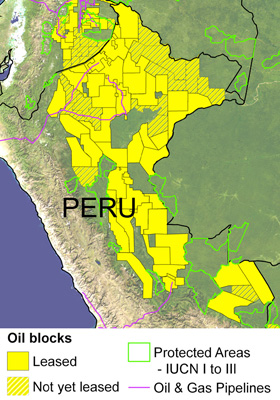A federal prosecutor in Peru filed murder charges against two police generals and 15 other officers over the deaths of indigenous protesters at a roadblock in June, reports the Associated Press. The Indians were protesting new rules that would have made it easier for foreign developers to exploit oil and gas, timber, and minerals in Peru’s Amazon rainforest. The skirmish left 23 police and at least ten protesters dead.
The charges come several weeks after dozens of civilians, including indigenous leaders, were charged with homicide over the deaths. Some are expected to be arrested once they are discharged from hospitals were they are recovering from injuries suffered during the protest.
The protests
 Oil and gas blocks in the western Amazon. Solid yellow indicates blocks already leased out to companies. Hashed yellow indicates proposed blocks or blocks still in the negotiation phase. Protected areas shown are those considered strictly protected by the IUCN (categories I to III). Image modified from Finer M, Jenkins CN, Pimm SL, Keane B, Ross C, 2008 Oil and Gas Projects in the Western Amazon: Threats to Wilderness, Biodiversity, and Indigenous Peoples. PLoS ONE 3(8): e2932. doi:10.1371/journal.pone.0002932 |
Indigenous groups have fiercely opposed what they see as encroachment on their traditional lands. In May thousands of protesters blocked roadways and rivers in opposition to a set of presidential decrees that would have made it easier for foreign firms to develop Amazon land. President Alan Garcia responded by sending in federal police, quickly leading to a heated standoff that ended in bloodshed — in addition to the deaths, at least 82 protesters were suffered gunshot wounds and another 120 were injured. The escalation was widely condemned by human rights groups and environmentalists.
Garcia has since rescinded two of the most controversial decrees and shuffled his cabinet. But the government has since indicated in public statements that it intends to move forward on oil and gas development despite the controversy.
Green groups and indigenous rights’ organizations say the rainforests slotted for oil and gas exploration is home to a wealth of biodiversity and “uncontacted” tribes. The Peruvian government maintains there is but a single isolated tribe and that development will bring vast sums to the treasury.







